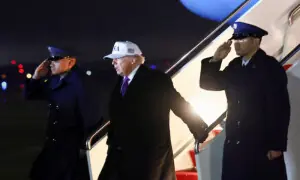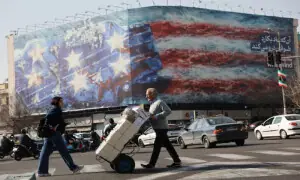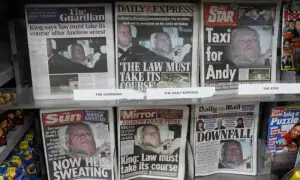Ukraine refuses to surrender Mariupol as Russia warns of humanitarian 'catastrophe'
5 min readUkraine on Monday rejected Russian calls to surrender the port city of Mariupol, where residents are besieged with little food, water and power in a humanitarian crisis that is increasing pressure on European leaders to toughen sanctions on Moscow.
Ukraine's government defiantly rejected Russian calls for Ukrainian forces in Mariupol to lay down their arms in exchange for safe passage out of the city and humanitarian corridors to be opened from 1000 Moscow time (0700 GMT) on Monday.
"There can be no question of any surrender, laying down of arms," the Ukrainska Pravda news portal cited Ukraine's Deputy Prime Minister Iryna Vereshchuk as saying.
"We have already informed the Russian side about this."
Biden to travel to Poland to discuss Ukraine crisis with Duda
Mariupol has suffered some of the heaviest bombardments since Russia invaded Ukraine on Feb. 24. Many of its 400,000 residents remain trapped as fighting rages on the streets around them.
Vereshchuk said over 7,000 people were evacuated from Ukrainian cities through humanitarian corridors on Sunday, more than half from Mariupol. She said the government planned to send nearly 50 buses there on Monday for further evacuations.
Russia and Ukraine have made agreements throughout the war on humanitarian corridors to evacuate civilians, but have accused each other of frequent violations of those.
The crisis in Mariupol and other devastated Ukrainian cities is likely to feature heavily in discussions between European Union leaders this week as they consider imposing tougher sanctions on Russia including an oil embargo.
EU governments will take up the discussion among foreign ministers on Monday, before US President Joe Biden arrives in Brussels on Thursday for summits with NATO's 30 allies, as well as the EU and in a Group of Seven (G7) format including Japan.
Diplomats told Reuters that Baltic countries including Lithuania are pushing for an embargo as the next logical step, while Germany is warning against acting too quickly because of already high energy prices in Europe.
In his latest appeal for help from abroad, Ukrainian President Volodymyr Zelenskiy addressed the Israeli parliament by video link on Sunday and questioned Israel's reluctance to sell its Iron Dome missile defence system to Ukraine.
"Everybody knows that your missile defence systems are the best ... and that you can definitely help our people, save the lives of Ukrainians, of Ukrainian Jews," said Zelenskiy, who is of Jewish heritage.
Zelenskiy also welcomed the mediation efforts of Israeli Prime Minister Naftali Bennett, who has held numerous calls with him and Russian President Vladimir Putin.
He said in his daily video address to Ukrainians that "sooner or later we will begin to have talks with Russia, possibly in Jerusalem".
Mariupol's council said on Telegram that several thousand residents had been "deported" to Russia over the past week. Russian news agencies said buses had carried hundreds of refugees from Mariupol to Russia in recent days.
US ambassador to the United Nations Linda Thomas-Greenfield told CNN the deportation accounts were "disturbing" and "unconscionable" if true, but said Washington had not yet confirmed them. read more
Reuters could not independently verify the claims. Russia denies targeting civilians.
Greece's consul general in Mariupol, the last EU diplomat to evacuate the city, said it was joining the ranks of places known for having been destroyed in wars.
"What I saw, I hope no one will ever see," he said.
Kyiv and Moscow reported some progress last week toward a political formula that would guarantee Ukraine's security, while keeping it outside NATO - a key Russian demand - though each side accused the other of dragging things out.
Few advances
Capturing Mariupol would help Russian forces secure a land corridor to the Crimea peninsula that Moscow annexed from Ukraine in 2014.
Putin says Russia's "special operation" is aimed at disarming Ukraine and rooting out dangerous nationalists. Western nations call it an aggressive war of choice and have imposed punishing sanctions aimed at crippling Russia's economy.
Ukraine and its Western backers say Russian ground forces have made few advances in the last week, concentrating instead on artillery and missile strikes.
Zelenskiy's adviser Oleksiy Arestovych said on Sunday there had been a relative lull over the past 24 hours, with "practically no rocket strikes on cities". He said front lines were "practically frozen".
Three civilians were killed and five were injured as a result of Russian shelling on Sunday in the east of the country, said Pavel Kirilenko, head of the Donetsk regional military administration. In the Kharkiv region one person was killed and one injured, and in Luhansk region two were killed and one injured.
In the capital Kyiv, Mayor Vitali Klitschko reported several explosions in Podil district and said rescue teams were putting out a large fire at the shopping centre. He said at least one person was killed.
Reuters was not able to verify the reports.
The UN human rights office said at least 902 civilians had been killed as of Saturday, though the real toll was probably much higher.
A five km area around a chemicals plant in the besieged northeastern city of Sumy the plant was hazardous due to an ammonia leak, Sumy regional Governor Dmytro Zhyvytskyy said. It was not known what caused the leak.
About 10 million Ukrainians had been displaced, including some 3.4 million who have fled to neighbouring countries such as Poland, the UN refugee agency said.
In the southern city of Kherson, video seen by Reuters showed dozens of protesters, some wrapped in Ukraine's blue-and-yellow flag, chanting "Go home" in Russian at two military vehicles with Russian markings. The vehicles turned and left.
"I want the war to be over, I want them (Russian forces) to leave Ukraine in peace," said Margarita Morozova, 87, who survived Nazi Germany's siege of Leningrad in World War Two and has lived in Kharkiv, eastern Ukraine, for the past 60 years.
For the latest news, follow us on Twitter @Aaj_Urdu. We are also on Facebook, Instagram and YouTube.























Comments are closed on this story.